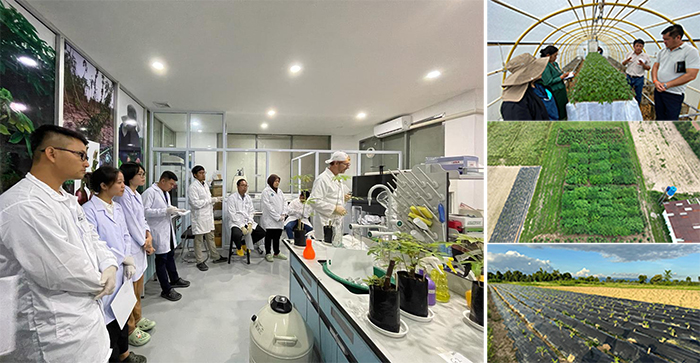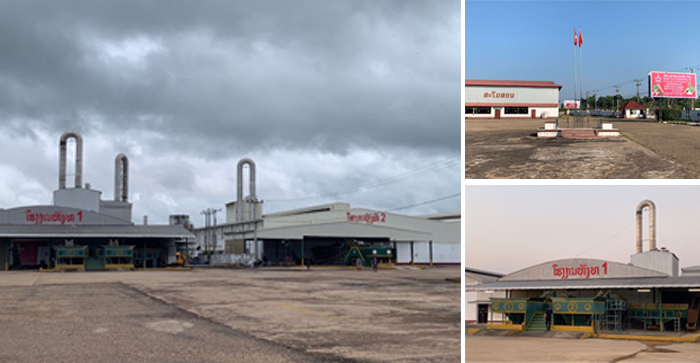Driving Asia's sustainable cassava value chain with developments in bioplastics, agriculture innovations, biogas and value added downstream products !
This 2024, CMT’s 12th Starch Value Chain ASIA goes to Vientiane Laos !
This event serves as a pivotal platform for industry leaders, researchers, and stakeholders to converge and explore the dynamic landscape of Asia’s starch market, with a special focus on fostering a sustainable cassava industry and promoting innovations downstream processing to starch and value added products.
Why Laos?
Laos has the potential to be a major cassava producer and in the last 5 months of 2023, it has been reported that Laos earned more than US$408 million by exporting cassava, making it the most profitable crop grown in the country.
The country has over 19 starch producing factories, out of which 7 factories are installing and will be opening in coming cassava season.
*Ref : Agricultural processing division, Dept of Agriculture
Addressing the challenges and opportunities within the starch industry in Asia, amidst shifts in consumption patterns, climate change, inflationary pressures are some of the issues that will catalyse discussions around sustainable practices, technological advancements, and market trends.
Global consumption of biodegradable polymers has risen sharply in the past few years, driven by regulations that aim to reduce plastic waste.
This has spurred many new projects for starch-based biodegradable polymers. Who are the established players in Asia for starch -based biopolymers and what are the main drivers.
Corn is the main feedstock for China’s bioethanol production as well as a great percentage of it goes towards animal feed. With its reliance on imports to meet its domestic demand, will China be able to rein in the expansion of processing capacity for corn-based ethanol fuel to ensure that the nation has enough corn or will it suspends its ethanol commitment ?
Find out more at the 12th Starch Value Chain ASIA event and hear from our line up of experts.
Key highlights:
- Collaborative partnerships, innovations in sustainable agriculture that can propel continuous growth in Asia’s cassava industry – hear from Thai Wah and Ingredion
- Opportunities for scaling up agritech innovation from farmers to factories
- Status, trends and new market opportunities in starch value chain in Laos
- Securing the future of the smallholder cassava sector
- Bioplastics & Asia starch market outlook
- China’s corn market & bioethanol policy - implications for regional starch markets
- Innovations in slowly digestible starches
Innovations in slowly digestible starches can drive the development of healthier food options for consumers. Here from food experts in Roquette as she shares more on the advancements in the field of low GI and slowly digestible carbohydrates.
- Innovative biodegradable composite foams from starch extracted from pineapple stems
- Banana starch/ flour as a potential feed ingredient
- Biogas in the starch sector, successes and failures and where we go next
- Developments in Low Gi Products
- Development of waxy and high-amylose cassava for industrial applications
|
Separately Bookable Site Visit |
|
Thursday, 29th Feb 2024 | (09:00 – 15:30 hrs.)
National Agriculture and Forestry Research Institute
The National Agriculture and Forestry Research Institute of Laos is mandated to undertake integrated agriculture, forestry and fisheries research in order to provide technical information, norms and results which help to formulate strategy in accordance with the government policies. NAFRI belongs to the Ministry of Agriculture and Forestry (MAF) and is equal in status to other technical departments under MAF.

&
KT Agricultural Development Tapioca
Processing Factory
KT Agricultural Development Co., Ltd has operated its Tapioca factory in Laos since 2021 with an aim to export the high-quality starch to China Mainland and Thailand. The factory has three sets of machinery that have a starch production capacity of 80,000 – 100,000 tons per year. The company selected the factory location in the middle of tapioca plantation and close to the Lao-China railway station which enables the transportation of their starch products, to Southern China and Eastern Thailand more convenient, faster, and cheaper.

| 09:00 |
Assemble at Crowne Plaza Hotel Lobby |
| 09:15 |
Depart |
| 10:15 |
Arrive National Agriculture and Forestry Research Institute
Brief introduction by Jonathan Newby on the tour
You will be visiting
Cassava tissue culture; molecular lab and disease screening; seed system and rapid multiplication; CMD resistance yield trials; |
| 12:00 |
Finish tour
Adjourn for Lunch |
| 13:30 |
Visit KT Agricultural Devt Tapioca processing factory
Tour for 1 hour |
| 14:30 |
Finish tour |
| 15:00 |
Return to Crowne Plaza Hotel | | | |

